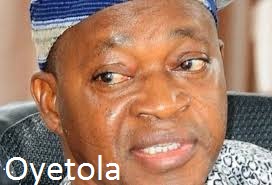Adegboyega Oyetola has operated behind the scenes in Osun State politics for several years. Now, quite precipitously, he is the latest politician on Nigeria’s political centre stage.
The 64-year-old All Progressives Congress governor-elect spent the better part of his political foray getting others elected, then helping them implement their policies by applying his vast experience as a long time accounting and brokerage executive in the private sector.
But Oyetola has never stood for election until earlier this year when the outgoing governor, Rauf Aregbesola, whom he served as chief-of-staff throughout his eight-year- two-term tenure, tapped him out of a long list of political protégés as his final anointed successor.
Although widely disputed by local and international observers, Aregbesola’s bet on a man said to be Bola Tinubu’s cousin paid off on Thursday night in one of the roughest paths to a political victory.
Standing for the APC, Oyetola had 255,505 votes against 255,023 votes for Ademola Adeleke, his closest challenger who ran on the platform of Peoples Democratic Party.
The 482 votes made all the difference in a state of 3.5 million people whose election political observers saw as a precursor to the 2019 general election.
Oyetola was up against a matching, if not greater, political force than himself in the election. Adeleke, a serving senator, came from a background rooted in politics. His father was an influential senator in Nigeria’s Second Republic between 1979-83.
Adeleke rejected the election as a charade and a coup against Osun residents, vowing to retrieve his mandate in court. Legal commentators believe he has a case, even as they acknowledge the Supreme Court has been reluctant to overturn governorship elections since 2010 when the Constitution was amended to allow gubernatorial election petitions terminate at the highest court like the presidential election petitions.
Aregbesola was the last Nigerian politician to be declared governor through the tribunal eight years ago, but he strongly holds that Adeleke would not be as lucky. The police and INEC denied all allegations of electoral malpractice during the election.
Although the choice of Oyetola did not entirely surprise many — considering his ties to Tinubu — the stunning turn of events between his nomination as a behind-the-scenes operative and Thursday’s victory has now presented the awaiting governor a unique challenge.
Patching a hemorrhage
Away from his known credit for deftly executing the policies of others, Oyetola must now cast his own vision — and in a manner that would not leave the people of the state perpetually demoralised. It is a transition that Mr Oyetola said he is well-equipped to make.
Oyetola is taking over a state which has become a lightning rod for reckless public expenditure by the opposition. Osun State has been known more for its financial turmoil, which often plays out with fast-hemorrhaging jobs and regular industrial action by workers.
He said during a debate on September 16 that he will emphasise the deployment of technology to boost school enrolment and tertiary education, as well as liberalise scholarships and train teachers.
While this may suggest a man willing to chart a different course from his predecessor, the now-governor-elect blurred the lines when he proposed to sustain some of the socialist policies of his outgoing predecessor, especially the free meal for students and a uniform for all pupils.
But timely and consequent income is perhaps the most crucial of areas a majority of workers in Osun would like to see Oyetola take a new approach. Since 2015, Aregbesola has been vilified for obvious lapses in reward for state workers, as many of them go without salaries for months.
In a state populated by civil servants and a moribund private sector, the challenges around salaries and wages have taken a devastating toll on the state’s economy. Aregbesola directed most of the blames to his predecessors, whom he accused of plunging the state into huge debts without a prudent repayment plan.
The governor said he borrowed funds to improve the state’s infrastructure and attract potential investments, but those were not anywhere near as much as the debt his predecessors racked up.
At some point in 2016, Osun State earned nothing in federal allocation after creditors pulled funds at source to offset due loans. As of May 2018, the state admitted a debt profile of over N170 billion but said chances that they will be liquidated by 2020 are bright.
But the claims were disputed by the PDP, which has been in opposition in the state since 2010 when Aregbesola retrieved his mandate from Olagunsoye Oyinlola in controversial Court of Appeal ruling. The party said Aregbesola took loans in excess of N200 billion, which would take 20 years to liquidate.
Not unexpected, Oyetola downplayed the acuteness of the state’s finances, saying the crises are exaggerated by the opposition and indicated he would advance the approach of the current administration.
He dismissed claims that salaries and wages are not paid on time and very little when they eventually hit workers’ bank accounts, saying the state adopted a “modulated” structure, which was carefully designed to help the state through its turbulent times.
“Levels 1 to 7 have full salaries. We are not owing anybody on levels 1 to 7. “Levels 8 to 10 now earn 75 percent. It is only 12 and above that earn 50 percent,” Oyetola said, adding that the arrangement was put in place by a joint committee government officials and state workers.
Oyetola says he has the expertise to improve the state’s finances by drastically addressing budget shortfalls from the day he is sworn into office on November 27.
The state has huge debts and unfunded liabilities that cannot be resolved in four years, according to Labake Ajiboye, a public finance consultant based in the capital Osogbo.
“Nothing about this is unique to Mr Oyetola. Candidates are always quick to make promises, even the novice knows that it is when the time comes for implementation that excuses would start mounting.”
Mrs Ajibola told Premium Times the perpetual crisis over salaries is amongst the reasons the election was so close, if not actually won by Adeleke.
“We still have the tribunal to decide whether Mr Adeleke did not win this election because of the things we witnessed, but salaries of workers really gave the current APC government a tough time during the election,” she said.
“If Mr Oyetola is able to turn the situation around during his tenure, let us expect his acceptance amongst residents to rise.”
Mr Oludare Odewunmi, a political analyst in Ede, said Oyetola’s tenure would be off to a good start considering his knowledge of the state’s current situation.
“He has a major advantage here as the chief-of-staff who understands the inner workings of government like no one else,” Odewunmi said. “He would not need to waste several months learning on the job as most of his challengers would have needed.
If his antecedents are anything to embrace for the time being, it is okay to be very optimistic about the incoming government he will lead.”
Born on April 25, 1956, in Iragbiji, Boripe Local Government Area, Oyetola attended IfeOluwa Grammar School in Osogbo, finishing in 1972. In 1978, he graduated from the University of Lagos with a degree in Insurance.
He obtained a master’s degree in Business Administration in 1990 from the same institution. His national youth service was in Potiskum between 1978 and 1979.
He joined Leadway Assurance Company Limited as an area manager between 1980 and 1987. From 1987-1990, he was an underwriting executive at Crusader Insurance Company Limited, before moving to Alliance and General Insurance in 1991.
Oyetola also worked as an oil and gas executive in several firms until 2011 when he was tapped by Aregbesola as his chief-of-staff, a position he is expected to retain until he forms his own government next month.
Premium Times





